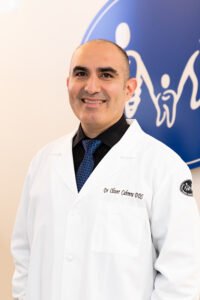It’s about more than keeping teeth clean
By Deborah Jeanne Sergeant

If your philosophy about dental health is “If it ain’t broken, don’t fix it,” you may want to rethink your outlook.
Dentist Wayne Lipschitz compares routine dental exams and cleanings akin to mammography and colonoscopy in that “you often have pathology that’s asymptomatic,” he said. “If you catch it early, you can treat it with conservative treatment versus root canals, crowns or implants.”
Lipschitz is a professor of clinical dentistry and director of both the University Dental Faculty Group and the Specialty Care Clinic at Eastman Institute for Oral Health.
Since cavities may not present with pain — especially when small — oral exams help keep teeth healthier than waiting for pain to exhibit.
Establishing a good relationship with a dentist through regular visits can help in cases when something urgent occurs.
“Sadly, a lot of patients end up in the ER with dental problems,” Lipschitz said. “It’s a strain on our healthcare system. When you go to the ER with a dental problem, it’s hours of waiting and more oral surgery-related whereas if you have your routine checks, you can be treated in a much more comfortable setting.”
If dental infections go unchecked, it can affect other areas of the body and not just the mouth. Lipschitz said that they can cause problems in the cardiac system, lungs and affect the ability to fight infections for people with compromised immune systems. The American Academy for Oral and Systemic Health states that “emerging science links oral health and systemic disease. Oral infections have been studied to have drastic and life-altering effects on systemic diseases including hypertension, adverse pregnancies, diabetes, Alzheimer’s disease, arthritis and more.”
Lipschitz added that good oral health and healthy aging correlate.
In addition to looking for cavities, dentists and hygienists also look for other direct problems in the hard and soft tissues of the mouth, such as the gums, tongue, cheeks and palates.
“Oral cancers are 3% to 4% of all cancers,” Lipschitz said. “About 50,000 people every year will be diagnosed with oral cancer. About 10,000 of those will die and about 50% will survive five years.”
The cancers caught early have a good prognosis. Oftentimes, the dentist or hygienist notices something is amiss in these cases and refers the patient to seek further care with a medical provider.

Arlene Messer, dentist at Contemporary Dentistry Rochester, said that looking for “lumps and bumps can indicate infection and other conditions like thyroid problems and swollen lymph nodes or tumors. We also do a temporomandibular joint check for any abnormalities like if there’s any pain at the joint or bite alignment.”
Problems in the jaw can cause premature wear on the joint and further problems with the teeth.
Dental hygienists clean teeth in ways that even good home care can’t.
“The hygienist uses instruments to remove biofilm between the teeth and along the gumline,” Messer said. “We use a device that’s like a little sandblaster that helps remove stain and biofilm. And other devices that go along the gumline to remove biofilm and its bacteria. Also, it removes the tartar, the hard stuff that’s on and between the teeth.”
Tartar build-up is important because it causes inflammation, which can go systemic.

Messer also said that people who have dry mouth are more cavity-prone and should especially make sure they see their dentist on the schedule recommended. Saliva provides a protective factor that keeps teeth healthy.
“As soon as I see adults whose salivary glands aren’t working well or they take medications that cause dry mouth, we start to see an uptick in cavities,” Messer said. “It’s an important thing we check.”
Dental care extends to whole patient care in some ways, as dental health can indicate other things going on with a patient.
“Usually, if we’re having a problem with dental health we have a problem with general health,” said Oliver Cabrera, dentist at Greece Family Dentistry and Implantology.
He added that his office provides a holistic approach with patient counseling about smoking, drug abuse, and nutrition as these affect dental health and by extension, overall health. Some patients do not regularly see a primary care provider, but do make it to the dentist.
“We look at other things like cosmetics if there are enhancements they’d like, such as straighter teeth and whiter smiles,” Cabrera said.

